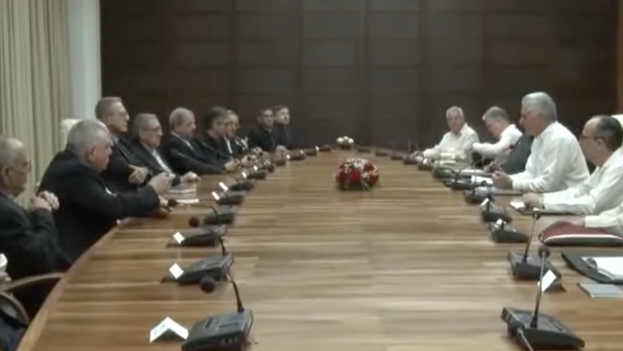
![]() 14ymedio, Madrid, 28 April 2023 — The Conference of Catholic Bishops of Cuba (COCC) issued an official statement this Friday about the meeting they held two days ago with President Miguel Díaz-Canel and other senior officials of the country.
14ymedio, Madrid, 28 April 2023 — The Conference of Catholic Bishops of Cuba (COCC) issued an official statement this Friday about the meeting they held two days ago with President Miguel Díaz-Canel and other senior officials of the country.
In it, they did not allude to something that Ariel Suárez, secretary of the Episcopal Conference, had acknowledged this Thursday to the Reuters agency: that the parties addressed the issue of the political prisoners arrested for the demonstrations of July 11, 2021.
Instead, the text affirms that the bishops “did not discuss specific positions of the Church, but shared with all respect, sincerity and clarity their concerns and assessments about the current moment in which we live.”
In addition, they appreciate “the possibility of the exchange, for the seriousness in which it was developed” and “the opportunity to be heard,” and they value “the importance and convenience of this experience, also for the future.”
It was an occasion, they conclude, “for the bishops to renew to the authorities their commitment to the Cuban people and to everything that favors a more serene climate of peace, harmony, respect for all and hope.”
Asked about the role of the Catholic Church in mediation with the regime, the Cuban priest Alberto Reyes, in an interview with 14ymedio, opined that the institution has its own limits, and that, despite its social impact and charitable works, “it is not a charitable organization or a political party.”
On the occasion of Reyes’ visit to Brussels, a group of European delegates condemned in a letter “the increase in citizen repression, the lack of freedom of expression and the absence of signs of openness and democracy” on the Island.
The letter, released this Friday by the Cuban Observatory of Human Rights and signed by Leopoldo López Gil, Javier Nart, Antonio López-Istúriz, Gabriel Mato, Enikö Györi, Soraya Rodríguez Ramos and Jordi Cañas, expresses its concern about “the unacceptable situation of political prisoners in Cuba, imprisoned for exercising their legitimate right to demand democratic changes on the Island.”
In addition, they refer to the “marked deterioration of citizen life in Cuba,” highlighted by “the recurrent lack of medicines, the growth of violence and the insecurity due to the precariousness suffered by its population.”
This, they continue, “has triggered critical levels of emigration, especially of the young population, which is forced to leave in the absence of a future.”
In accordance with the Political Dialogue and Cooperation Agreement, in force between Cuba and the European Union, they call for the holding of “free, transparent and guaranteed elections, which serve for the country to return to the democracy that its citizens so long for.”
On Wednesday, 50 relatives of political prisoners on the Island sent a letter to the European Parliament in which they exposed the precarious situation of the detainees after the mass protests of July 11, 2021 [11J] in Cuba.
The signatories noted in their letter that, in September of that same year, the European Parliament approved resolution P9-TA (2021) 0389, which condemned the “government repression” that was being reported from numerous cities in Cuba. Relatives describe this document as “one of the most forceful texts in favor of the freedom of the Cuban people.”
They also noted the most recent attempt at mediation for the release of the prisoners, during the visit of Cardinal Beniamino Stella, special envoy of Pope Francis and former ambassador of the Vatican during the Special Period. Stella, supported by the pontiff, had requested “an amnesty or some form of clemency” for political prisoners. The members of the Cuban Episcopal Conference also joined the demand, without a concrete response from the Government.
Although Stella’s statements suggested that there had been a conversation at the highest level about those imprisoned, Miguel Díaz-Canel’s public reaction was to affirm that he would try to find “the solution to the expectations of both parties.” But the negotiation, in which several countries, such as Spain, claimed to be willing to offer asylum to the interested parties, again came to nothing.
Translated by Regina Anavy
____________
COLLABORATE WITH OUR WORK: The 14ymedio team is committed to practicing serious journalism that reflects Cuba’s reality in all its depth. Thank you for joining us on this long journey. We invite you to continue supporting us by becoming a member of 14ymedio now. Together we can continue transforming journalism in Cuba.
